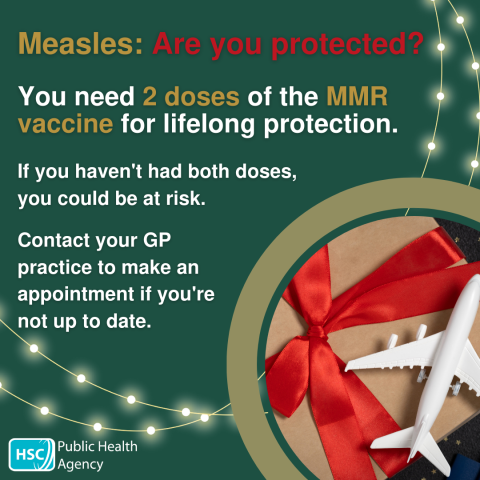Make sure MMR vaccine is up-to-date before travelling this Christmas

Those who have never received the measles vaccine are being encouraged to do so as soon as possible by the Public Health Agency (PHA) to reduce their risk in the lead up to Christmas.
Following a rise in measles cases in England, the PHA is reminding everyone that if you’re planning on travelling this festive period to make sure you and your loved ones are up-to-date with your measles, mumps and rubella (MMR) vaccination.
Measles is an acute infection caused by a virus that spreads very easily. It used to be very common in children, but following the introduction of the MMR vaccine, cases fell. Recently we have seen a slight decrease in the numbers of children receiving the vaccine. It is therefore important vaccination coverage is improved as soon as possible to help prevent the spread of avoidable, serious and sometimes deadly diseases such as measles.
Louise Flanagan, Consultant in Public Health at the PHA, said: “It is vital that all children are immunised with the MMR vaccine as part of the childhood vaccination programme.
“The childhood programme has been a tremendous success, with Northern Ireland traditionally having uptake rates above the UK average, which is why we have seen very few cases of illnesses such as measles compared with the rest of the UK. However, some vaccines have seen a decline in uptake in recent years, which risks a return of some of the diseases that they offer protection against.
“If you are unsure if your child is up-to-date with vaccinations, the easiest way to check is to look at your child’s red book or speak to your GP surgery or health visitor. If your child has missed any vaccination, please contact your GP surgery to book an appointment as soon as you can to make sure they have maximum protection against disease.”
Although most common in children, measles can occur at any age. It is highly infectious and is caught either through direct contact with an infected person, or through the air when they cough or sneeze.
For most children, measles is just a very unpleasant illness, but for a few it can have more serious complications. These can include pneumonia, encephalitis (inflammation of the brain) and even death.
Louise continued: “It is important for our population to keep very high uptake levels of the MMR vaccine to help prevent the spread of infection. I would like to reassure parents that the MMR vaccine is very safe and the most effective way to prevent measles, mumps and rubella infections.
“Parents who choose not to vaccinate their children are leaving them exposed to measles, mumps and rubella, and all three of these diseases can have very serious complications.”
The initial symptoms of measles can include:
- a runny or blocked nose;
- sneezing;
- sore, red eyes that may be sensitive to light;
- a high temperature (fever);
- a cough;
- a few days later, a red-brown blotchy rash will appear. This may start on the head or upper neck, before spreading outwards to the rest of the body.
Most childhood rashes are not measles but you should consult your GP without delay if:
- you suspect it is measles;
- symptoms worsen;
- temperature increases to above 38°C;
- temperature stays high after other symptoms have gone.
Measles is very infectious so it is important that anyone with suspected measles avoids any situation where they can spread the disease, such as a GP’s waiting room or an emergency department waiting room. People should therefore phone in advance and get advice rather than turning up to these venues.
For further information see www.pha.site/MeaslesLeaflet
